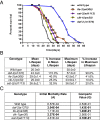Uncoupling lifespan and healthspan in Caenorhabditis elegans longevity mutants
- PMID: 25561524
- PMCID: PMC4311797
- DOI: 10.1073/pnas.1412192112
Uncoupling lifespan and healthspan in Caenorhabditis elegans longevity mutants
Abstract
Aging research has been very successful at identifying signaling pathways and evolutionarily conserved genes that extend lifespan with the assumption that an increase in lifespan will also increase healthspan. However, it is largely unknown whether we are extending the healthy time of life or simply prolonging a period of frailty with increased incidence of age-associated diseases. Here we use Caenorhabditis elegans, one of the premiere systems for lifespan studies, to determine whether lifespan and healthspan are intrinsically correlated. We conducted multiple cellular and organismal assays on wild type as well as four long-lived mutants (insulin/insulin-like growth factor-1, dietary restriction, protein translation, mitochondrial signaling) in a longitudinal manner to determine the health of the animals as they age. We find that some long-lived mutants performed better than wild type when measured chronologically (number of days). However, all long-lived mutants increased the proportion of time spent in a frail state. Together, these data suggest that lifespan can no longer be the sole parameter of interest and reveal the importance of evaluating multiple healthspan parameters for future studies on antiaging interventions.
Keywords: functional capacity; gerospan; healthspan; healthy aging; lifespan.
Conflict of interest statement
The authors declare no conflict of interest.
Figures









References
-
- World Health Organization (2014) 10 Facts on Ageing and the Life Course. Available at www.who.int/features/factfiles/ageing/en. Accessed November 28, 2014.
-
- Meara E, White C, Cutler DM. Trends in medical spending by age, 1963–2000. Health Aff (Millwood) 2004;23(4):176–183. - PubMed
Publication types
MeSH terms
Grants and funding
LinkOut - more resources
Full Text Sources
Other Literature Sources
Molecular Biology Databases

